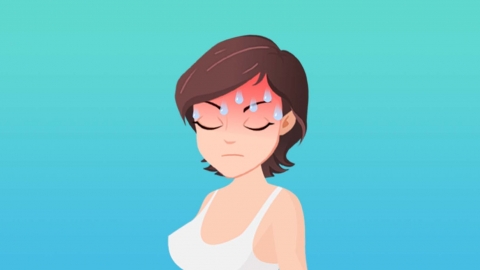Why does one experience spontaneous sweating?
In general, excessive sweating (night sweats or spontaneous sweating) may be caused by factors such as high ambient temperature, excessive mental stress, hyperthyroidism, diabetes, or tuberculosis. It is recommended to seek timely medical attention, identify the underlying cause, and receive symptomatic treatment under a doctor's guidance. Specific analysis is as follows:

1. High environmental temperature: When the surrounding temperature is too high or clothing is too heavy, the body's thermoregulatory center activates heat dissipation mechanisms, leading to increased sweating. Symptoms can be relieved by moving to a cool, well-ventilated area, reducing clothing, and drinking warm water.
2. Excessive mental stress: Prolonged anxiety or tension can stimulate sympathetic nervous system activation, causing abnormal sweat gland secretion. Maintaining emotional stability, practicing deep breathing or meditation, and seeking psychological counseling when necessary can help manage symptoms.
3. Hyperthyroidism: Caused by excessive secretion of thyroid hormones, this condition accelerates metabolism and often leads to heat intolerance and excessive sweating. Patients should follow medical advice to take medications such as methimazole tablets, propylthiouracil tablets, or carbimazole tablets. Radioactive iodine therapy may also be used to destroy part of the thyroid tissue and reduce hormone production.
4. Diabetes: Blood glucose fluctuations can affect nerves and metabolism, resulting in abnormal sweating. Patients need to regularly monitor blood glucose levels, take medications such as metformin hydrochloride sustained-release tablets, gliclazide sustained-release tablets, or acarbose tablets as prescribed, maintain a controlled diet, and engage in moderate exercise.
5. Tuberculosis: Caused by infection with *Mycobacterium tuberculosis*, it commonly presents with night sweats. Patients must follow medical instructions for combination therapy using drugs such as isoniazid tablets, rifampicin capsules, and pyrazinamide tablets, adhering to the principles of early, regular, and complete treatment.
Daily management includes maintaining a comfortable indoor temperature and humidity, wearing breathable and moisture-wicking clothing, keeping a regular sleep schedule and avoiding late nights, eating a balanced diet rich in nutrients, and engaging in moderate physical activity to strengthen the body and reduce the frequency of excessive sweating.




